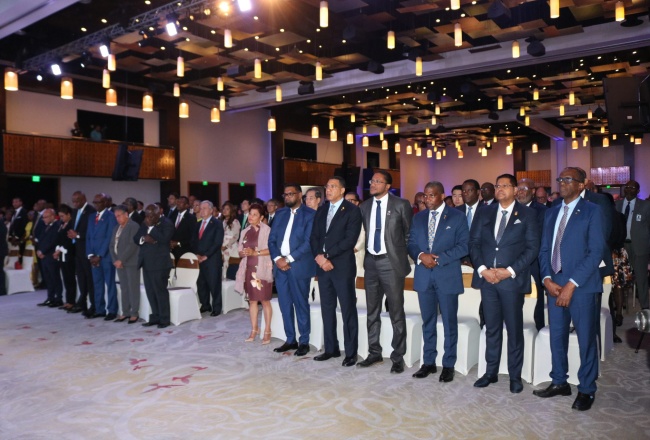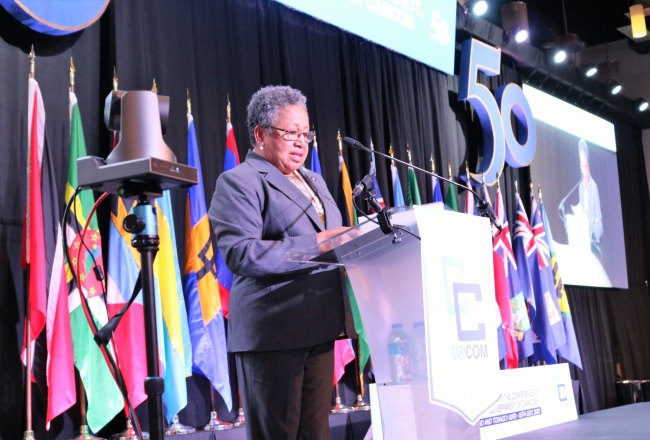CARICOM 50 Years Strong
By: , July 4, 2023The Full Story
Secretary-General of the Caribbean Community (CARICOM), Dr. Carla Barnett, says the regional integration movement remains strong 50 years on and has laid a solid foundation on which leaders can continue to build.
She noted that the foundation has been laid regionally and internationally by stalwarts who have been standard bearers for integration and for CARICOM to have its rightful place in the global Community.
She said that despite the global crisis, the deleterious effects of climate change and natural disasters, and threat of national security, “the achievements of the past five decades are proof that vision and concerted action are critical to achieving sustainable prosperity and security for our region”.
Dr. Barnett was speaking at Monday’s (July 3) opening ceremony of the 45th Regular Meeting of Heads being held in Port of Spain, Trinidad and Tobago.
Prime Minister, the Most Hon. Andrew Holness and Minister of Foreign Affairs and Foreign Trade, Senator the Hon. Kamina Johnson Smith, are attending the meeting, which ends on July 5.
This year’s gathering also commemorates the 50th anniversary of the formation of CARICOM.
Dr. Barnett said that CARICOM has made a mark internationally and demonstrated that the constraints of small size can be overcome by collaboration and integration.
“It was CARICOM that spearheaded the formation of the African, Caribbean and Pacific States, now the Organisation of African, Caribbean and Pacific States (OACPS), and led negotiations with Europe for preferential trading arrangements.
“CARICOM was at the forefront of the struggles for the United Nations (UN) recognition of small island and low-lying coastal developing states and later played a critical role at COP 21 in Paris in 2015, resulting in the agreement to limit global warming to 1.5 degrees above preindustrial levels,” the Secretary General pointed out.
She said that critical regional institutions have also been established, including the Caribbean Public Health Agency (CPHA), the Caribbean Disaster Emergency Management Agency (CDEMA), and the Caribbean Community Climate Change Centre (CCCCC).
“We are grappling with a multifaceted crisis – crime and security, constitutional and political and humanitarian in our most heavily populated Member State, Haiti. As our community seeks to assist the Haitian people to find an effective solution to the crisis, we have appointed an Eminent Persons Group, which has started to facilitate dialogue among key Haitian stakeholders, beginning with a broadly inclusive engagement held in Jamaica two weeks ago. This work will continue,” she pointed out.
CARICOM Chairman and Prime Minister of Dominica, the Hon. Roosevelt Skerrit, said the region can be proud of the integration movement.
“It is no mean feat that we are the longest-surviving economic integration movement in a developing world and second only to the European Union globally. We have things that we should be proud of, and so it is with justifiable pride that we should all say, I am CARICOM,” he said.
He noted that work is still needed to make the community viable, prosperous, secure and beneficial to all of its people. Some of the areas cited were the issue of free movement, the ongoing crisis in Haiti, and greater youth engagement.
Outgoing CARICOM Chairman and Prime Minister of The Bahamas, the Hon. Philip Davis, in his address, pointed out that strengthening regional cooperation was a key area of focus during his tenure.
“In January, when The Bahamas assumed the Chair of the Caribbean Community, I noted that regional cooperation has never been more urgent and necessary. I am happy to report that during the past six months, we have seen a lot of that regional cooperation in action,” he said.
“Part of the experience of the COVID-19 pandemic was the demonstration of the fact that working together, we can ensure the safety of us all,” he contended, noting that progress has been made on priority issues such as security and climate change.
Prime Minister of Trinidad and Tobago, Dr. Keith Rowley, said that the integration movement has shown that the region is stronger together.
He noted: “Even though we are an amalgam of small pieces of the globe, on the world stage we might be small, but we are not insignificant. As CARICOM, we are at our strongest, we could be at our best. Let’s claim our space in this world and let’s just do it,” he said.
UN Secretary-General, António Guterres, also addressed the opening ceremony and highlighted CARICOM’s influence in international relations.
The Caribbean Community was established on July 4, 1973 with the signing of the Treaty of Chaguaramas in Trinidad and Tobago. The twin-island republic, Barbados, Jamaica, and Guyana were the original four signatories.
The Community now has 15 Member States and five Associate Members.





